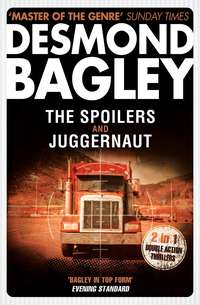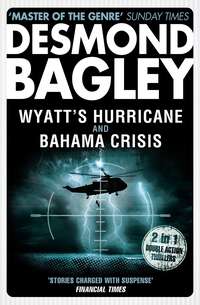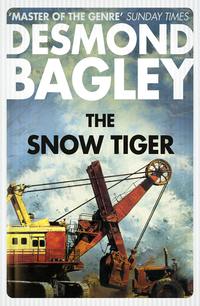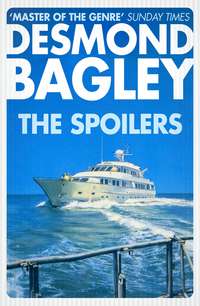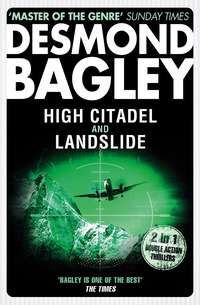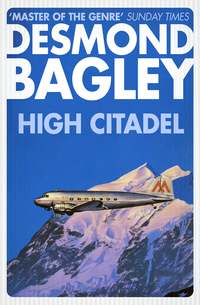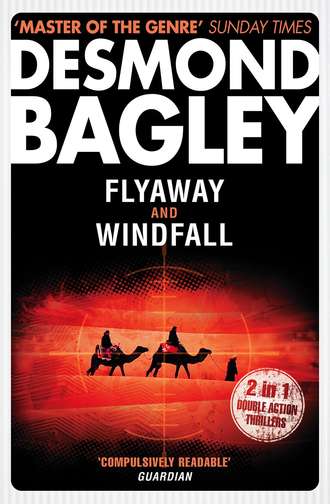
Полная версия
Flyaway / Windfall
About seven miles in two hours, then we stopped for a rest and food. There was no vegetation in Koudia at all but Mokhtar had thoughtfully gathered a bundle of acacia twigs while waiting for us at Assekrem and soon had a fire going to boil water for the inevitable mint tea. I said to Byrne, ‘Don’t you ever drink coffee?’
‘Sure, but this is better for you in the desert. You can have coffee when we get back to Tam. Expensive, though.’
The sun was past its height and sinking towards the west as we sat in the shade of the Toyota. This was the hottest part of the day and, in Koudia, that meant really hot. The bare rocks were hot enough to fry eggs and the landscape danced in a constant heat shimmer.
I remarked on this to Byrne, and he grinned. ‘This is winter – would you like to be here in summer?’
‘Christ, no!’
‘This is why they wouldn’t give Billson a permis. And come nightfall the temperature will drop like a rock. You leave water exposed out here and you’ll have half an inch of ice on it by three in the morning. If Billson is lost he’ll either have burned to death or frozen to death.’
‘I like a cheerful man,’ I said acidly.
Mokhtar had disappeared about his private business but suddenly he appeared on top of a boulder about two hundred yards away. He gave a shrill whistle which attracted our attention, and waved both his arms. ‘He’s found something,’ said Byrne, scrambling to his feet.
We went over to Mokhtar and that took us more than ten minutes in that ankle-breaking terrain. When we were fifty yards away Mokhtar shouted something, and Byrne said, ‘He’s found a truck. Let’s see if it’s a Land-Rover.’
As we scrambled on top of the boulder, which was as big as a moderate-sized stately home, Mokhtar pointed downwards, behind him. We walked over and stared to where his finger was pointing. There was a vehicle down there behind the boulder, and it was a Land-Rover. Or, at least, it had been – it was totally burnt-out. There was no sign of Billson or anyone else, and I suddenly realized that I wouldn’t know Billson if I saw him. I was a damn fool for not having a photograph.
Byrne said, ‘The black smoke would come from the burning tyres. Let’s get down there.’
Going down meant going back the way we had come and walking around the boulder. As we came in sight of the Land-Rover, Byrne, in the lead, spread his arms to stop us. He spoke rapidly to Mokhtar who went on ahead, peering at the ground. Presently he waved and Byrne walked over to him, and they had a brief discussion before Byrne beckoned to me.
‘There’s been another truck here; its tracks are on top of those of the Land-Rover, and it went that way.’ He pointed back in the general direction of the Toyota.
‘Where’s Billson?’ My mouth was dry.
Byrne jerked his head at the Land-Rover. ‘Probably in there – what’s left of him. Let’s see.’
He stood up and we walked over to the Land-Rover. It was a total wreck – a burnt-out carcass; it sat on the ground, the wheel rims entangled in the steel reinforcing wires of what had been tyres. There was still a lingering stench of burning rubber in the air.
The window glass had cracked and some of it had melted, and the windscreen was totally opaque so that it was difficult to see inside. Byrne reached out and tugged at the handle of the door on the driver’s side and cursed as it came away in his hand. He walked around and tried the other door. He jerked it open and looked inside, with me looking over his shoulder.
The inside was a mess. The upholstery had burned, releasing blackened coil springs, and even the plastic coating of the driving wheel had burnt away, leaving bare metal. But there was no body, either in front or on the rear seats.
We went around to the back and got the tailgate open, to find scant remnants of what appeared to be two suitcases. Again, no body. I said, ‘The other truck must have taken him away.’
‘Maybe,’ said Byrne noncommittally. He poked around a bit more in the ruined Land-Rover, then he straightened up. ‘Did Paul Billson have any enemies?’
‘He may have had.’ I went cold as I realized we were speaking of Billson in the past tense just as his half-sister had done. I said, ‘I hardly think he’d have the kind of enemy who would follow him to the middle of the Sahara to kill him.’
‘Mmm.’ Byrne made a nondescript noise and continued his examination. ‘I’ve seen lots of burnt-out trucks,’ he said. He picked up a jerrican lying to one side, snapped open the cap, and sniffed. ‘He had gas in here. He must have been carrying it in the back there, because he had no cans strapped on the side when he left. This is empty now.’
‘Perhaps there was an accident when he was refilling the main tank.’
‘Then where’s the body?’
‘As I say – the other truck rescued him.’
Byrne stood back and looked at the Land-Rover, then talked more to himself than to me. ‘Let’s see; twenty-eight gallons in the main tank plus about four in the can – that’s thirty-two. He’d need at least twenty to get here, so he was in trouble without a fire – he didn’t have enough gas to get back to Tam. That leaves twelve gallons – eight in the tank and four in this can, I’d say.’
‘How do you know the can wasn’t empty? He could have refilled his main tank anywhere – even before Assekrem.’
‘There’s been gas in the can until quite recently – it smells too strong. And when I picked it up the cap was still closed. Now, if that can had been full of gas during the fire it would have exploded – but it hasn’t.’
Byrne seemed to be arguing in circles. ‘So he put it in the main tank,’ I said exasperatedly.
‘No,’ said Byrne definitely. ‘I’ve seen a lot of burnt-out trucks in the desert, but never one like this – not with all four tyres gone like that, not with so much fire damage up front.’ He bent down to examine the petrol tank, and then crawled under.
When he emerged he stood up and tossed something in his hand. ‘That was lying on the ground.’ It was a small screw cap with a broken wire hanging from it. ‘That’s the drain cap for the gas tank. The wire which is supposed to stop it unscrewing has been cut. That makes it certain. Someone doused this truck with gas from the can, then decided it would be a good idea to have more. So he drained another four gallons from the tank – maybe eight – to do a really good job of arson. You don’t get auto tyres burning all that easily. Then he tossed in a match and went away, and the guy who would do that wouldn’t be rescuing Billson.’
‘So where’s Billson?’
‘Don’t know. Maybe we’ll find his body around here some place.’
I remembered something. ‘The man I put on Billson’s track back in England seemed to think that someone else was also looking for him.’ I frowned. ‘And then Hesther Raulier …’ I pulled out my wallet and found the note she had enclosed with the air ticket. I scanned it and handed it to Byrne.
He read it through, then said, ‘Know this guy, Kissack?’
‘Never heard of him.’
‘Neither have I.’ He gave me back the note.
‘Another thing,’ I said. ‘Billson might have had a lot of money with him. I think he smuggled it out of the UK.’
‘What do you call a lot of money?’
‘The thick end of £60,000.’
Byrne whistled. ‘I’d call that a lot, too.’ He swung around and rooted in the back of the Land-Rover where all that was left of two suitcases were the locks, hinges, metal frames and a pile of ashes. He said, ‘Whether Billson’s money was in here when the fire bust out we’ll never know without a forensic laboratory, and those are a mite scarce around here. Was it common knowledge that Billson would be carrying so much loose dough?’
‘I shouldn’t think so,’ I said. ‘It’s really only a guess on my part.’
‘You don’t have a monopoly on guesses,’ said Byrne. ‘And a lot of guys have been killed for less than that.’
As we walked away from the Land-Rover I said, ‘Funny that the chap who did this should close the cap on that empty jerrican; especially as he was going to leave it.’
‘Probably automatic,’ said Byrne. ‘I do it myself. Good habit to have.’
‘I’d still like to know what Billson was doing here,’ I said.
‘He was looking for a wrecked airplane, like you said. And he’d have found it, too – it’s about five miles further north of here. I was going to head there if we hadn’t found this. Billson must have heard about it back in Tam so he came for a look-see, the goddamned fool!’
‘It couldn’t be …’ I began.
‘Of course it couldn’t be his father’s plane,’ said Byrne tiredly. ‘It’s a French military airplane that force-landed back when they were getting ready to blow an atom bomb up at Arak. They got the crew out by chopper, then went back to take out the engines and some of the instruments. Then they left the carcass to rot.’
He went to talk to Mokhtar, and I sat on a rock feeling depressed. Billson must have been the biggest damned fool in the history of the Sahara. He had probably read the Land-Rover’s Owner’s Manual and taken the manufacturer’s fuel consumption claim as gospel, but it’s one thing tooling along a motorway and another fighting your way through Koudia. I doubt if we’d been getting more than five miles to the imperial gallon since we left Assekrem and perhaps ten or twelve in Atakor. I don’t think it’s disrespectful to British Leyland to suggest that the Land-Rover was averaging about the same.
But Billson had probably measured straight lines on a map and set out on that basis. But that was water under the bridge or, more accurately, vapour through the carburettor. What we had now was an entirely different set of circumstances in which Billson’s idiocy didn’t figure because, if we found his body it would be because he had been murdered by a man, and the man was possibly called Kissack.
It was then that I made the discovery. Mokhtar or Byrne would probably have done it, but they didn’t – I did, and it brought back some of my self-respect as a working member of this crazy expedition and made me feel something less of a hanger-on while others did the work.
I was looking down idly at the rock on which I sat when I noticed a small brown stain over which an ant was scurrying. For a moment I wondered how even an ant could live in Koudia, and then I noticed another and then another. There was quite a trail of them going backwards and forwards between a crack in the rock and the stain.
I stood up, looked at the Land-Rover, took a line on it, and then explored further away. Sure enough ten yards further on there was another stained rock, and a little way along there was another. I turned. ‘Hey!’
‘What is it?’
‘I think I’ve found something.’ Byrne and Mokhtar came up and I said, ‘Is that dried blood?’
Mokhtar moistened the tip of his little finger and rubbed it on the stain, then he sniffed his fingertip delicately, looked at Byrne, and said one word. ‘Yeah,’ said Byrne. ‘It’s blood.’
‘There’s a line of it coming from the Land-Rover.’ I turned and pointed towards a narrow ravine. ‘I think he went up there.’
‘Okay – Mokhtar goes first; he’s better at this than we are. He can see a sign you wouldn’t know was there.’
Billson, if it was Billson’s blood, had gone up the ravine but fairly soon it became obvious that he hadn’t travelled in a straight line. Not because of the difficulty of the terrain because he had dodged about quite a bit when he had no obvious need to, and on occasion he had reversed his course. And the blood splashes got bigger.
‘Hell!’ I said. ‘What was he doing? Playing hide-and-seek?’
‘Maybe he was at that,’ said Byrne grimly. ‘Maybe he was being chased.’
We found him at last, tumbled into a narrow crack between two rocks where there was shade. Mokhtar gave a cry of triumph and pointed downwards and I saw him sprawled on sand which was bloodstained. His face wasn’t visible so Byrne gently turned him over. ‘This Billson?’
‘I wouldn’t know,’ I said. ‘I’ve never seen him.’
Byrne grunted and felt about the body. The face of the man was puffy and swollen and his skin was blackened. Incongruously, he was wearing a normal business suit – normal for England, that is. At least I had had the sense to visit a tailor to buy what was recommended as suitable attire for the desert, even if the tailor had been wrong to the point of being out of his mind. The probability rose that this was indeed Billson.
Byrne said, ‘Whoever the guy is, he has a hole in him. He’s been shot.’ He held out his fingers, red with liquid blood.
‘He’s alive!’ I said.
‘Not for long if we don’t do something.’ Byrne spoke to Mokhtar, who went away fast. He then turned the man over so that he lay more easily and put his hand inside his jacket to withdraw a passport and a wallet from the inside breast pocket. He flipped open the passport one-handedly. ‘This is your boy; this is Paul Billson.’ He gave me the passport and wallet.
I opened the wallet. It contained a sheaf of Algerian currency, a smaller wad of British fivers, and a few miscellaneous papers. I didn’t bother to examine them then, but put the passport and the wallet into my pocket.
‘We’re in trouble,’ said Byrne. He indicated Billson. ‘Or he is. If he stays another night he’ll die for sure. If we try to take him out he’ll probably die. You know how rough it’ll be getting back to Assekrem; I don’t know if he can take it in his condition.’
‘It’s a question of the lesser of two evils.’
‘Yeah. So we try to take him out and hope he survives.’ He looked down at Billson. ‘Poor, obstinate bastard,’ he said softly. ‘I wonder how well Hesther knew his old man? She said in her note to you that she’d wired me. I didn’t tell you it was a ten-page cable, and she was pretty firm and detailed in her instructions.’
‘Has the flow of blood stopped?’ I asked.
‘Yeah; I have the tail of his shirt wadded into the hole. We can’t do much until Mokhtar gets back. He won’t be long.’
‘You must have known about Paul Billson before I arrived.’
‘Sure I did, but he’d taken off by then.’
I said, ‘If you hadn’t waited for me you could have got here earlier.’
‘Not much. I got Hesther’s cable the morning you came. I don’t know when she sent it, but the communications in this country aren’t noted for reliability.’
‘But you did lead me a little way up the garden path.’ It seemed odd to be making conversation over the body of a man who was probably dying.
Byrne said, ‘I wanted time to size you up. I don’t like to travel with people I can’t trust. Hereabouts it can be fatal.’
‘So I passed the examination,’ I said flatly.
He grinned. ‘Just by a hair.’
A shadow fell athwart us. Mokhtar had come back. He had brought cloth for bandages, water, and a couple of sand ladders. The sand ladders, as Byrne had earlier explained, were to put under the wheels of the Toyota if we got stuck in sand. They were about six feet long and of stout tubular steel. ‘Only stinkpots need them,’ Byrne had said. ‘Camels don’t.’
Byrne tore off a strip of cloth, soaked it in water and put it in Billson’s mouth; being careful not to choke him. Then he proceeded to dress the wound while Mokhtar and I lashed the sand ladders together to make an improvised stretcher.
It took us over an hour to get Billson the comparatively short distance back to the Toyota.
FIFTEEN
We had travelled two hours’ worth into Koudia but it took us four hours to get out from the time Byrne started the engine until we drove beneath the peak of Assekrem. He picked his way as delicately as he could through that rocky desolation but, even so, Billson took a beating. Fortunately, he knew nothing of it; he was unconscious. I tended him as best I could, cushioning his body with my own, bathing his face, and trying to get some water into him. He did not move voluntarily nor did he make a sound.
I had expected Byrne to stop at Assekrem where perhaps we could have got help from the Haratin at the Hermitage, but he drove past the beginning of the path up the cliff and we camped about three miles further on. Mokhtar took a roll of cloth from the back of the Toyota and very soon had a windbreak erected behind which we laid Billson. It was now dark so Byrne redressed the wound in the acid light of a glaring pressure lantern.
He sat back on his heels and watched Mokhtar administer a salve to Billson’s blackened face. ‘If we can get some water into him he might survive,’ he said. ‘That’s only a shoulder wound and the bullet went right through without hitting bone. Weakening but not killing. He’s suffered more from exposure than the wound.’
I said, ‘Why didn’t you stop at Assekrem? They might have had something to help him.’
‘Not a chance.’ He nodded towards the Toyota. ‘I have more stuff in my first aid kit than there is in the whole of the Ahaggar, if you except the hospital at Tam. Besides …’ His voice tailed away, which was odd in Byrne because he was usually pretty damned decisive.
‘What’s the matter?’
‘Do you know anything about Algerian law?’
‘Not a thing.’
‘Well, Billson broke one of them. He came out here without a permis.’
‘So did you.’
‘But I didn’t apply for one – he did. You can be sure that when he disappeared from Tam they knew where he’d gone. There are police posts on all the main tracks out of Tam and when he didn’t show up at any of those they’d be sure. So when he shows up in Tam he’ll be arrested.’
‘At least he’ll get hospital treatment,’ I said. ‘And when he’s out of hospital I’ll stand bail.’
‘You’ll be lucky,’ said Byrne drily. ‘Because this guy is going to show up with a bullet hole in him and Algerian cops are no different than any other cops – they don’t like mysterious bullet wounds. It’s going to be a mess.’
He held up a finger. ‘One – Billson has broken the law, and it’s a serious offence. The Algerians are nuts on security and they don’t like foreign nationals floating around the desert tribes unobserved. That could mean prison and I wouldn’t wish my worst enemy in an Algerian prison.’ A second finger joined the first. ‘Two – he comes back with a bullet wound and that the cops won’t like either. It’s not an offence to be shot but it means someone else ought to be in jail, and that means trouble where there ought to be no trouble.’ A third finger went up. ‘Three – the guy who was shot is a foreigner and that brings Algiers into the act complete with a gaggle of diplomats. As far as I know Britain broke off diplomatic relations with Algeria years ago. I don’t know who represents British nationals here – could be the Swiss – but that means a three-cornered international hassle, and no one is going to like that.’
‘I begin to see the problems,’ I said thoughtfully.
‘Four,’ said Byrne remorselessly. ‘And this is the big one. Supposing we take Billson into Tam and he goes into hospital. It’s only a small place and within twelve hours everybody is going to know about the man in hospital who was shot – including the guy who shot him …’
‘… and who thinks he’s dead,’ I chipped in.
‘… and whom Billson can identify. What’s to stop him having another crack and finishing the job?’
‘If he’s still around.’
‘What makes you think he won’t be?’ Byrne stood up and looked down at Billson. ‘This guy is giving everybody a pain in the ass – including me.’ He shook his head irritably. ‘If it wasn’t for Hesther …’ His voice tailed away again.
‘Is there an alternative to Tam?’
‘Yeah.’ He kicked at the sand. ‘But I’ll have to think about it.’
He went over to the truck and came back with the rifle, then spoke to Mokhtar who took a full magazine from the pouch hung on his neck. Byrne slipped it into the rifle with a metallic click, worked the action to put a bullet up the spout, and carefully set the safety-catch. ‘I suppose you know how to use one of these, Colonel, sir?’
‘I have been known to.’
‘You might have to use it. It shoots a shade to the left and upwards; say, two inches at ten o’clock at a hundred yards. We’ll stand watches tonight.’
I frowned. ‘Expecting trouble? I’d have thought …’
He broke in. ‘Not really, but Billson will have to be watched throughout the night.’ He held up the rifle. ‘This is for unexpected trouble.’
I stood the middle watch in order to give both Byrne and Mokhtar an uninterrupted run of sleep; I didn’t know where we were going if it wasn’t Tammanrasset, but wherever it was they would have to take me there, so they were more important than me.
Billson was unmoving but still breathing, and I thought he looked a shade better than he had. For one exasperated moment that evening I had thought of quitting and going back to London. As Byrne had said – though less politely – Billson was nothing but trouble for everyone who came near him, and I did think of leaving him to stew in his own juice.
But the thought of going back and telling Alix Aarvik about all this made my blood run cold. Besides, it wouldn’t be fair on Byrne and Mokhtar who had gone to a great deal of trouble to help a man they didn’t know. Also, I would have to be on hand when Billson recovered because someone had to get him out of the country as he had very little money left. And London was far away and receding fast, and I found I quite enjoyed the desert in a masochistic way.
I took the rifle and looked at it in the dim light of the fire. it was an old British Lee-Enfield .303 and, judging by its low number, it had seen service in the First World War, as well as the Second. I took out the magazine and worked the action to eject the round in the breech, then looked down the barrel into the fire. It was as clean as a whistle and any hardened sergeant would have had to give Mokhtar full marks. He had looked after it well. I reloaded and laid the rifle aside, then checked Billson again.
Towards the end of my watch he began to stir and, just before I woke Byrne, he had begun to mutter, but his ramblings were incoherent. I put my hand to his brow but he did not seem to be running a temperature.
I woke Byrne. ‘Billson’s coming to life.’
‘Okay; I’ll tend to him.’ Byrne looked at the sky to get the time. He wore no watch. ‘You get some sleep. We start early; our next camp is at Abalessa.’
I wrapped myself in my djellaba because it was very cold, and lay down. I wasted no time wondering about Abalessa but fell asleep immediately.
Billson was obviously better in the morning, but he was dazed and I doubt if he knew where he was or what was happening to him. We bedded him down in the back of the Toyota on the camel hair cloth that had served as a wind-break and on a couple of djellabas. ‘We can get some camel milk once we’re out of Atakor,’ said Byrne. ‘And maybe scare up some hot soup. That’ll bring him around better than anything else.’
We travelled fast because Byrne said we had a long way to go. Coming out of Atakor we encountered the Tuareg camp we had passed on the way in. They were packing up to go somewhere but found some warm camel milk for Mokhtar. Byrne had thrown a djellaba casually into the back of the truck, covering Billson, and stood guard. ‘There’s no need for anyone to see him.’
We left the camp and stopped for a while a little later while we spooned milk into Billson. He seemed even better after that, even though the skin was peeling from his face and the backs of his hands in long strips. Mokhtar applied more salve and then we set off again, with Byrne really piling on the speed now that the country was much better.
These things are relative. Coming from the green land of England, I would have judged this place to be a howling wilderness. All sand, no soil, and the only vegetation an occasional clump of rank grass and a scattering of thorn trees which, however desirable they may have been to a camel, did nothing for me. But I had not just come from England; I had come from Koudia and Atakor and what a hell of a difference that made. This country was beautiful.
We travelled hard and fast, making few stops, usually to top up the tank with petrol from the jerricans. Billson finished the milk and was able to drink water which put a bit more life into him, although he still wandered in his wits – assuming he had any to begin with. Once Byrne stopped and sent Mokhtar on ahead. He disappeared over a rise, then reappeared and waved. Byrne let out the clutch and we went ahead at a rush, topping the rise and down the other side to cross what, for the Sahara, was an arterial highway.


